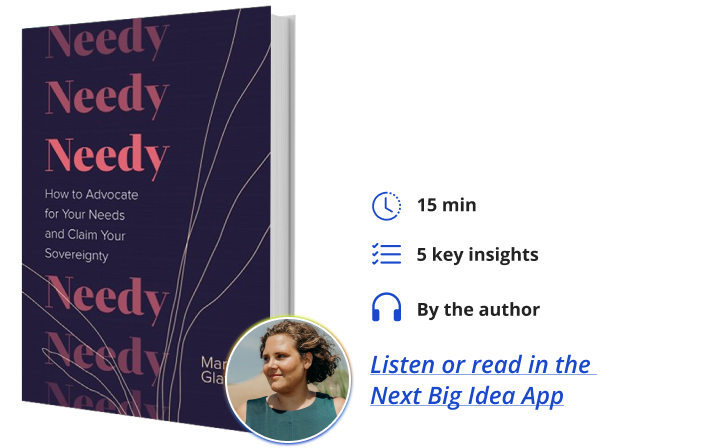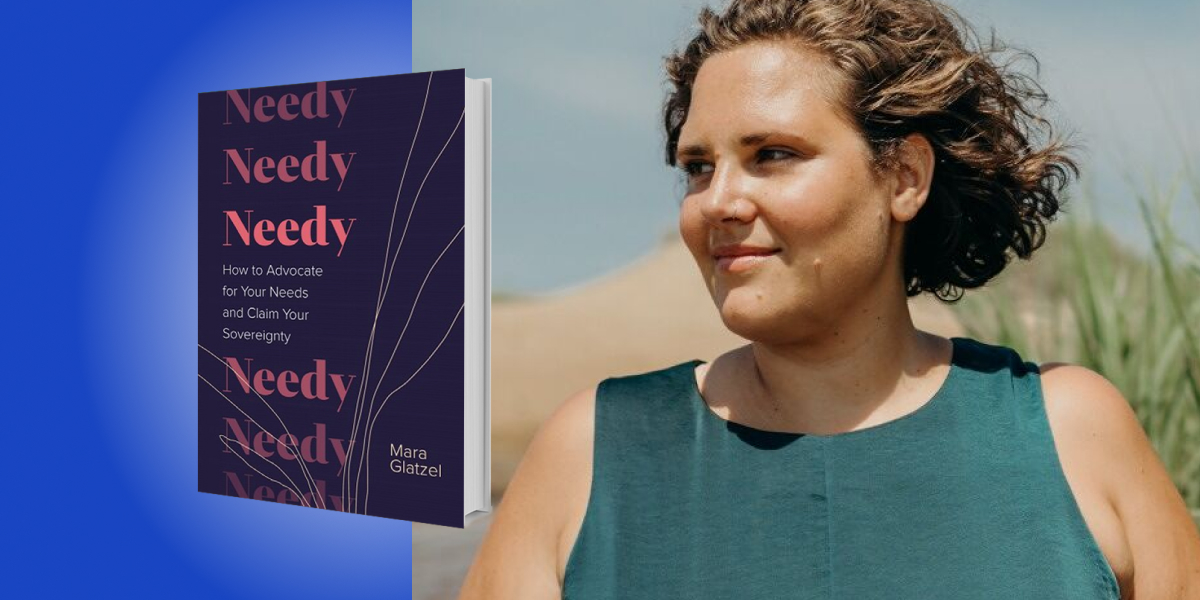Mara Glatzel is an intuitive coach and podcast host of Needy. She helps people move from self-abandonment to self-partnership by honoring and advocating for their needs.
Below, Mara shares 5 key insights from her new book, Needy: How to Advocate for Your Needs and Claim Your Sovereignty. Listen to the audio version—read by Mara herself—in the Next Big Idea App.

1. You are a human and humans have needs.
The presence of your needs is a fact and not a flaw. Your needs aren’t weaknesses or failures. Your life’s purpose isn’t to override your needs to micromanage other people’s perceptions of you or to produce more quickly or neatly.
Too often, we are taught that these tender, human parts of ourselves will be wedged between us and the belonging that we ache for. But belonging, too, is a human need and we must stop believing that we need to trespass against ourselves to belong to others. You are a human, and humans have needs.
A need is something that you require, and a want is something you desire. Needs and wants work in concert, where the need becomes the what and the want becomes the how.
Take breakfast, for example. This morning I was hungry and needed to eat, but what I wanted to eat was a gluten-free waffle with blueberry compote, vanilla yogurt, maple syrup, and hemp seeds. The need is my hunger, but the desire for a specific taste is the pleasure vehicle that makes the breakfast uniquely satisfying.
This may sound simplistic, but feeding myself in this manner requires me to occupy space in the center of my life. My needs must matter to me enough for me to slow down to meet them. My own satisfaction must matter to me enough to get curious about exactly what I am hungry for. Your needs are guideposts leading you home to your most true and fully expressed self.
When you stop banishing your needs to the margins and welcome them into every conversation, relationship, and moment, your life instantly becomes more humane, sustainable, and satisfying.
2. It’s time to rebrand the word needy.
This book is pro-neediness, because what is neediness apart from a bid for connection? Neediness is a voracious hunger to matter, a deep yearning to be prioritized and handled with care, and I absolutely want that for all of us.
Your needs were never the problem, even as our social understanding of them has become littered with examples of disposable, rejectable, unlovable, unworthy, clingy, too-much humans—hungry ghosts who are never satisfied. I’m sure each of us is easily able to conjure an image in our mind’s eye.
Needs become challenging to hold—both for us and the people around us—when they are not understood, verbalized, or well-tended. They become more challenging when we endeavor to outsource them to others because we were never given the tools to tend to them ourselves and because we were taught that minimizing our needs is an act of love and service. You have needs and those needs are your responsibility.
“Believing that you can earn your way to deserving your needs sets up a pattern of over-working and over-functioning that will surely create the conditions for burnout.”
Expecting others to know what you need is an unfair expectation. Expecting others to meet the needs that you are unable to show up for is an unfair expectation. Believing that you can earn your way to deserving your needs sets up a pattern of over-working and over-functioning that will surely create the conditions for burnout.
And yet, continuing to peddle our neediness as an embarrassing, shameful thing keeps us from getting our needs met. It doesn’t make us less needy. It makes us more needy, by all but guaranteeing we will become more enmeshed in the stories we carry about our needs.
To find our way out of this emotional entanglement, we require education, role models of people centering their needs and setting boundaries, and hearing the stories of other needy humans bravely continuing to ask for what they need.
3. Real self-care is responsive, not prescriptive.
Being a human is gloriously inconvenient. Our physical, mental, and emotional bodies resist definition. We sweat, cry, need, and yearn in ways that do not slip easily into color-coded Google calendars, but our bodies are always communicating and we can learn to understand their language. We require care—real care, not the self-care being sold to us.
The self-care industry is steadily responding to our collective burnout, but continually misses the mark by prioritizing surface-level care over the restoration that accompanies true nourishment. We love to talk about flowery self-care because it feels beautiful, aspirational, and manageable. But, real, deeply impactful self-care is responsive, not prescriptive. It requires healing the chasm in your relationship with yourself so that you can feel seen, heard, and held. Self-trust is built when we learn to turn towards ourselves instead of chasing a beautiful plan created by and for someone else.
Embarking on the journey of caring for yourself in this way is simple. Ask yourself how you are doing and wait for truthful answers to surface. Ask yourself what you need and devote yourself to meeting those needs in whatever way is most doable. Do less and more often. Stop waiting for a spree of gloriously blank days in your calendar to start caring for yourself in tiny and meaningful ways each day.
“The self-care industry is steadily responding to our collective burnout, but continually misses the mark by prioritizing surface-level care over the restoration that accompanies true nourishment.”
But caring for yourself in this way can be complicated, too. It requires unlearning the cultural stories and familial beliefs that stand between you and nourishment. It requires divesting from systems of oppression and questioning the many ways you have embodied these messages and recreating these patterns of behavior in the expectations you have of yourself and others each day.
4. There is never going to be a better time to end a cycle of self-abandonment.
Let’s define self-abandonment as anything other than a full embrace of your needs. Bypassing or ignoring your needs is an abdication of your role of tender steward and sovereign leader of your own life. When your needs are lovingly attended to, something profound inside of you shifts. With time, this tending heals the part of you that has been held at arm’s length or avoided altogether.
You may not identify with self-abandonment, even as you are routinely dehydrated, holding out on getting up to pee as a reward for scratching just one more thing off the to-do list or saving your expensive body oil for a “special occasion,” only to have it go rancid.
I started taking better care of myself by safeguarding two minutes in the bathroom behind a closed door while I brushed my teeth. I remember those two minutes feeling excruciating, when everything in me wanted to rush and grab my phone to multitask, brush my teeth while checking email, minding my calendar, and being relentlessly connected to what everyone else wanted from me.
Simultaneously, those two minutes felt ridiculous. I wanted the solution to be something sexier—a big, beautifully crafted plan to reinvent my entire life in 10 days (or less). Yet, those perfect plans had always left me overwhelmed to the point of inaction and stewing in self-loathing, believing the lie that there was something so broken in me that there was no point in trying to make it better. The more broken I saw myself, the further distanced I was from my burgeoning self-belief and trust. I incorrectly assumed that my discomfort meant I needed to go back to the start to create a better plan.
“Being uncomfortable doesn’t mean that you are doing it wrong.”
This is the crux of self-abandonment: I am imperfect; therefore, I am wrong and must be fixed by doing more. That perfect plan does not exist, but we will spend our entire lives in pursuit of it when really, the only way forward is through. Being uncomfortable doesn’t mean that you are doing it wrong. Self-partnership is holding your own hand as you squelch through the muck, taking strides toward taking up space in a way that feels impossible and essential. Learning to be with yourself within the discomfort builds self-trust and yields results.
5. You’ve been working on yourself, but it’s time to work with yourself.
Growing your relationship with yourself from self-abandonment to self-partnership is the life hack you’ve been looking for. It’s not easy. There is no shiny package that will perfectly detail the route to get there. Identifying, honoring, and advocating for your needs is a practice done in partnership with yourself. There is no quick fix.
You have been conditioned to believe that you are a big problem that requires a big fix, which is why you’ve turned a blind eye to slow, incremental changes in your life. There is nothing particularly sexy about reclaiming two minutes and repurposing them to connect more deeply with yourself. And yet, this is what works.
Tending to your needs is about pouring yourself a glass of water and unhooking from the cultural stories that keep you striving to earn your worth. It is about nurturing the habits that sustain your energy and receiving your own care as a daily reminder that you matter. Radical self-responsibility informs responsive self-care, which rebuilds self-trust and blossoms into self-acceptance and self-love.
It is time to ask the question: What do I need right now? You want more than scraps, but the life you want isn’t going to magically happen through recreating someone else’s Instagram photo or embodying their definition of success looks like. You’ve been conditioned to operate this way.
A deeply rich and satisfying life is built by asking yourself What do I want? What do I need? and your willingness to honor your own response. Radical change happens when you stop working on yourself and start working with yourself. It’s not something you’ve been taught. Until now.
To listen to the audio version read by author Mara Glatzel, download the Next Big Idea App today:
































